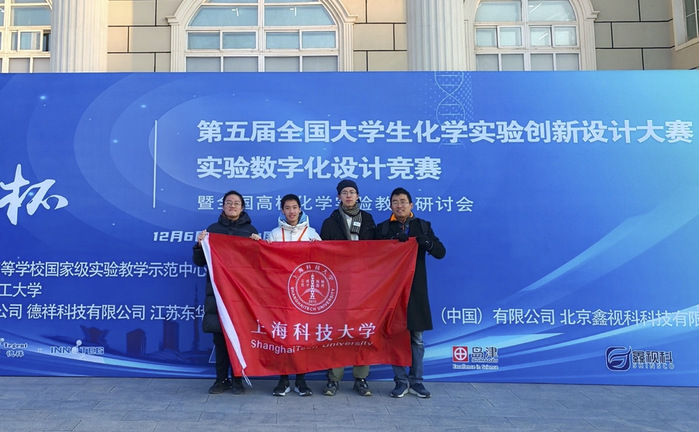The 5th National Chemistry Experiment Innovation Design Competition for College Students—Competition in Digital Design of Experiments, held from December 6 to 8 at Shenyang Normal University, concluded with a significant achievement for ShanghaiTech University. After intense competition, the ShanghaiTech team won the Second Prize, marking the university’s first recognition in this national competition and the highest prize secured by any university in Shanghai this year.
The team was composed of 3 undergraduate students majoring in chemistry from the School of Physical Science and Technology (SPST) and guided by SPST Assistant Professor Yan Jiajun. The team members included Zhou Yicheng ’27 (team leader), Huang Xuhao ’27, and Tang Yihui ’27.

Group photo. From left to right: Huang Xuhao, Zhou Yicheng, Tang Yihui, Yan Jiajun
This year’s competition attracted 533 teams from 264 universities nationwide. Of these, 103 teams from 78 universities advanced to the final round. The project presented by ShanghaiTech’s team was “Digital Design of Continuous Flow Azo Dye Synthesis.” The team’s journey began six months ago, marking their first participation in the competition. Under the guidance of Prof. Yan, the team started from scratch—grasping the theoretical foundations of chemistry experiments, learning computer programming skills, and applying digital design software. Through persistent exploration and iterative optimization, they developed and refined their project. The SPST Chemical Experiment Teaching Center also offered strong support, including laboratory space, equipment, materials, academic guidance, and assistance with presentation preparation. The teams’ seamless cooperation, deep understanding of their work, and excellent presentation during the competition earned them the award.
Organized by the Chinese Chemical Society and the Joint Committee of National Experimental Teaching Demonstration Centers of Higher Education of the Ministry of Education, this competition is a multidisciplinary and comprehensive competition for chemistry undergraduates nationwide. This year’s competition focuses on the cultivation of talents in chemistry experiment digitalization, providing a platform for students to showcase their concepts and exchange ideas on digital design of chemistry experiments, and facilitating the integration of digital tools such as AI, with chemistry experiment teaching.

